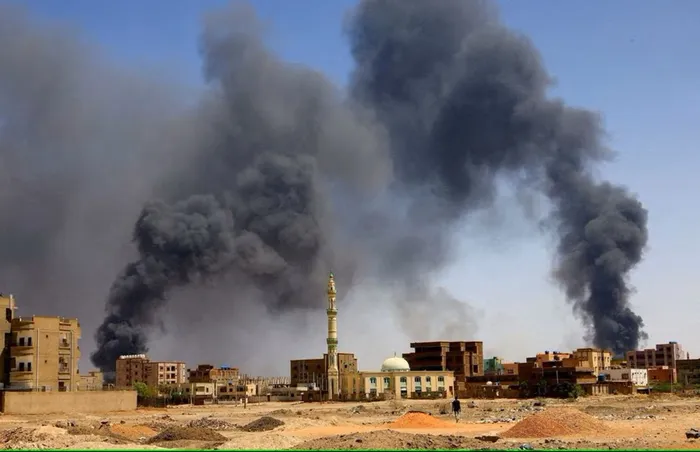‘As Sudan’s generals massacre people, organise against state’

Picture: ANA file – Smoke rises above buildings after an aerial bombardment. The paramilitary Rapid Support Forces and the army in Khartoum North, Sudan, clashed in the capital overnight and into Friday morning, June 2, 2023, after talks aimed at maintaining a ceasefire and alleviating a humanitarian crisis collapsed. The resistance committees must organise for a transition to a democratic power from below, the writer says.
By Charlie Kimber
A massacre in Sudan’s capital Khartoum underlines the horrific effects on ordinary people as rival wings of the military battle for power. At least 27 people died and 106 were injured after a market in a poor area south of Khartoum was shelled, according to local residents.
Troops fired six tank shells and rockets from al-Shajara, one of the areas the regular army controls, towards the neighbourhood of Mayo. Mayo is populated mostly by people who have not been able to afford to leave Khartoum since fighting broke out between the army and the paramilitary Rapid Support Forces (RSF) seven weeks ago.
The civilian death toll is at least 900, according to official counts, but the real number is far higher. It does not include, for example, at least 11 babies who died in a single day as a result of malnutrition and frequent power cuts at Khartoum’s Mygoma Orphanage.
Dr Abeer Abdullah said the fighting had prevented all but a handful of staff members from caring for hundreds of children. “They needed to be fed every three hours. There was no one there,” Dr Abdullah said. “We tried to give intravenous therapy but most of the time we couldn’t rescue the children.” She estimated at least 50 had now died.
More than a million people have been forced from their homes nationwide, and 400,000 have left the country. According to the United Nations, 25 million people — more than half the country’s population — are short of food, medicines, and water.
The generals who began the battle for control — Abdel Fattah al Burhan and Mohamed Hamdan Dagalo, better known as Hemeti — are directly responsible for the carnage. Having squashed moves to democracy in a coup in 2021, these warlords are ready to wade through blood to advance their own narrow interests.
Burhan — who is the head of the armed forces — and Hemeti — leader of the RSF state militia — have worked together until now. Backed by different regional governments and major imperialist powers, they’re now contesting for the spoils of heading the state.
The killings are a massive challenge to activists who have battled to change Sudan since December 2018, when people rose up against the 30-year rule of dictator Omar al-Bashir.
Revolt drove out Bashir. But the liberals who ideologically dominated the opposition forces have repeatedly put their faith in deals with the military. And again and again, the generals have reneged on promises to allow civilian rule.
Burhan and Hemeti are as bad as each other. The alternative has to come from the resistance structures and grassroots networks formed during the revolution. But that means a shift. These bodies need to move from just organising the much-needed welfare and protection services to challenge for state power.
Resistance committees are debating how to move forward. One example is in the city of Atbara, a historic area of workers’ resistance. It was here that railway workers fought British colonialism — and it was one of the first areas of a fightback over price rises in 2018.
Atbara resistance committees have been holding “informal but intense discussions”. One participant told Middle East Eye website, “The elites are responsible for the hijacking of the revolution and its great slogans of freedom, peace and justice.”
He added that the resistance committees are against both Burhan and Hemeti. But he said that they maintain some sympathy with the army itself, particularly its younger rank-and-file soldiers and junior officers.
But there can be no reliance on any of the existing structures of the armed forces. What’s needed is mutiny by ordinary soldiers. That will happen systematically only if the resistance committees fight against the generals through the methods of class struggle. They have to combine providing the necessities of life and defence against the state’s “bodies of armed men” with anti-military agitation and strengthening local democratic networks.
Hamid Murtada, a member of a resistance committee in Khartoum, said, “Neighbourhood resistance committees have coordination mechanisms that they use to co-operate with each other. They allow them to exchange information and keep our social protection network alive to support civilians.
“They have an important role in supporting initiatives that will end the war immediately. What happens afterwards is a story for another day.”
But the future can’t be left to chance. The military can allow resistance committees to maintain basic social needs—and then butcher the activists later. The committees have to prepare urgently to fight for a genuinely democratic power from below—and offer an alternative to all the generals and the rich.
Timeline of revolution
- December 2018:
- April 2019:
- 11 April 2019:
- 3 June 2019:
- August 2019:
- October 2019:
- July 2020:
- October 2021:
- 6 Nov 2021:
- 21 Nov 2021:
- 2 January 2022:
- 15 April 2023:
You will find solidarity updates at menasolidaritynetwork.com
Charles “Charlie” Nicholas Kimber is the National Secretary of the Socialist Workers Party of the United Kingdom
This article was first published in Socialist Worker